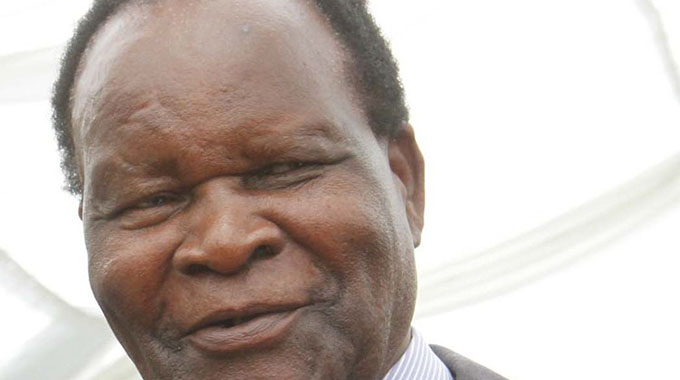CITES: Africa’s time has come

Emmanuel Koro Correspondent
Pro-sustainable use environmentalists worldwide, including UN Convention on International Trade in Endangered Species of Fauna and Flora (CITES) former Secretary-General Eugène Lapointe, have greeted the news of John Scanlon’s resignation with a call for the appointment of a well-qualified African as the new Secretary-General.
Since the Convention came into force 43 years ago in 1975, Europeans, a Canadian and an Australian have monopolised the leadership position at CITES. Yet most of its work has focused on the conservation of endangered wild fauna and flora in Africa and Asia.
This discrepancy in the activities and leadership of CITES has provoked considerable conflict over the past few years.
Therefore, according to Lapointe of the Switzerland-based IWMC, “It is absolutely imperative that we correct historic imbalance. The time has come to give another part of the world a crack at leading CITES. And it cannot be doubted that there are some very qualified candidates in Africa who are more than fit to be appointed as its Secretary-General.”
The Australian born Scanlon, has announced that he will be resigning as of April 6, 2018.
Announcing his decision in a CITES Press statement released on February 7, 2018, Scanlon said, “After serving for eight years as Secretary-General of the CITES Secretariat (and three years with the UN Environment Programme in Nairobi prior to that) I will soon be completing my mandate with the Convention and taking up my next career challenge.”
His statement continued, “We have made extraordinary strides in the fight against illegal wildlife trade, including through the International Consortium on Combating Wildlife Crime, and we are seeing tangible results from our collective efforts. Amongst many other successes, one can name; bringing more marine and timber species under CITES, new initiatives with the technology, tourism and transport sectors, reaching out to rural communities and the youth, and 3 March being declared as UN World Wildlife Day.”
How will the next Secretary-General of CITES be appointed?
Scanlon said that since mid-January 2018, he had been working very closely with the executive director of the UN Environment Programme (UNEP), his Chief of Staff, and the chair of the CITES Standing Committee towards ensuring a “smooth transition to my successor.
“We are working together to ensure the recruitment process is conducted expeditiously and in a way that respects UN personnel rules and the Memorandum of Understanding (MoU) between the CITES Standing Committee and the Executive Director, which was agreed to and signed in 2011,” said the outgoing CITES Secretary General.
Scanlon leaves CITES at a time when the organisation is fast losing credibility. Pro-sustainable environmentalists worldwide increasingly see it as having been captured by animal rights groups. These groups continue to sponsor votes to ban regulated trade in fauna and flora and their products, even where there is scientifically justified evidence to the contrary.
This has earned the CITES Secretariat and its animal rights sponsors the bad image of exercising authority without responsibility. For example, CITES and animal rights groups are busy shutting down ivory markets in China, Japan and the USA, using the senseless ban-trade-in-wildlife products-to-stop-poaching approach. These developments have continued to anger conservationists from Southern Africa and Asia, in particular. They are now exploring possibilities to pull-out of CITES and start their own trading partnerships with countries that want to buy their ivory and rhino horn.
An economist or anyone who honestly wants to understand the truth knows that to ban trade in any commodity does not stop poaching. Godfrey Harris, Managing Director of the Ivory Education Institute (IEI) said, “Ending trade without dealing with demand only succeeds in raising the price of the banned commodity. Increased prices encourage more poaching. In the case of ivory, a ban favoured by the animal rights groups and its CITES supporters puts elephants in greater danger; it is not saving them from a premature death.”
In fact, many people wonder how CITES trade bans can stop the Chinese, Europeans, Japanese, and others from their tradition of consuming and using ivory and rhino horn products. It would be the same as banning the consumption of hamburgers in America. Would anyone listen?
The future will confound those who are peddling lies that ivory and rhino horn trade bans can help to stop poaching. They always talk about animals and do not talk about socioeconomic costs to African elephant and rhino range states and rural communities living side by side with these iconic species.
Harris of the Los Angeles-based IEI said that an African CITES Secretary General leading the enforcement of the UN Convention on Trade in Endangered Species “is likely to balance the needs of people with the needs of the animals.”
Meanwhile, the CEO of South Africa-based True Green Alliance, Ron Thomson said, “I welcome the appointment of a qualified African as the next CITES Secretary General, provided he does not come from Kenya or Botswana – both of them which have pro-animal rightists administrators.”
The United Nations Environment Programme Executive Director will conduct the CITES Secretary General recruitment process in accordance with UN personnel rules. This includes advertising the position and establishing an assessment panel to interview short-listed candidates and then recommend suitably qualified candidates to the UN Secretary-General.
Emmanuel Koro is an award-winning environmental journalist who has written extensively on environment and development issues in Africa.









Comments